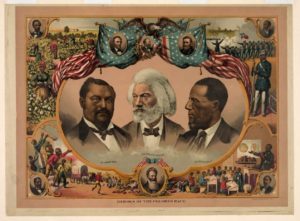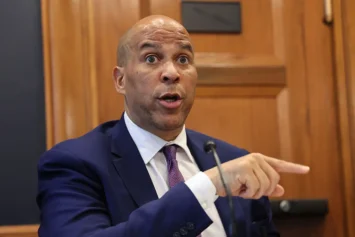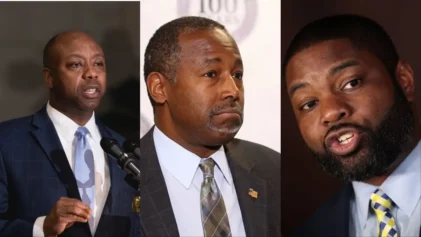
Head-and-shoulders portraits of Blanche Kelso Bruce, Frederick Douglass and others by J. Hoover, 1881 (Library of Congress; Flickr)
With the Obama presidency in the rearview mirror, Black people are assessing what they have to show for it and what, if anything, they have gained. As Black people struggle to find their way through the era of Donald Trump, a question that must be asked is this: What is the purpose of the Black politician these days anyway? What does it mean to be an African-American office holder, an elected official or lawmaker in Trump’s America, amidst this white nationalist renaissance?
Back in the day, that being 150 years ago, with the Civil War over and the first Reconstruction in effect, the answer was clear. (We are arguably on the verge of a third Reconstruction, as Rev. William Barber asserts, the second presumably taking place during the Civil Rights Movement.) We looked to Black political leadership to stand up for us. Radical Republicans in a Black-white coalition ran the South for a time, based on racial justice, empowerment of the formerly enslaved, protection of civil rights for Black people, labor rights, public education and the like. There was a rise in Black political activism as Black people mobilized and organized, held freedmen conventions and formed equal rights leagues to demand their rights and economic independence. As a result, Blacks constituted a major political force in the South, in some cases a majority of voters and a majority of Southern Republicans. They soon joined forces with Northern Republicans.
Between 1867 and 1877, there were around 2,000 African-American elected officials. Ultimately, however, they were stopped in their tracks. When federal troops left the South and were no longer present to protect the Black population, a Ku Klux Klan reign of terror reinstated white supremacist power and Black economic subjugation and disenfranchisement to the South. The Republican coalition of Blacks and whites disintegrated as Democratic white supremacists “redeemed” the Southern states and gained control from Republican rule. Elections turned violent in an effort to suppress the Black vote and remove Black elected officials. The Klan targeted Republican politicians, assassinating at least 35 Black leaders during Reconstruction, according to History.com, and terrorizing their white colleagues as race traitors. Meanwhile, new Democratic-controlled state governments established Jim Crow laws that divested Black people of their civil rights. The 40 acres and a mule the government once promised to Black people never came to fruition and the planter class, never in support of Black power, was able to perpetuate the economic exploitation of politically disenfranchised Black folks under the name of sharecropping.
Fast forward a century and the Congressional Black Caucus was formed to overcome the isolation of Black lawmakers and “get organized for group action,” as Rep. Charles Diggs Jr. of Michigan proclaimed, according to the House of Representatives website, which also noted that the purpose of the CBC was to “seize the moment, to fight for justice, to raise issues too long ignored and too little debated.”
“The thrust of our elections was that many Black people around America who had formerly been unrepresented now felt that the nine Black members of the House owed them the obligation of also affording them representation in the House,” said Rep. Louis Stokes of Ohio, adding that “in addition to representing our individual districts, we had to assume the onerous burden of acting as congressman-at-large for unrepresented people around America.” And as Rep. William (Bill) Clay of Missouri stated, “Black people have no permanent friends, no permanent enemies … just permanent interests.” In his view, their mission was to “parlay massive voting potential into concrete economic results.” There is strength in numbers, to be sure.
And yet, in expecting Black politicians to promote Black interests, fight for them and bring home concrete, positive results, the Black community often has found itself deeply disappointed. Having Black faces in high places makes for effective symbolism and good optics, up to a point, but what happens after that? Certainly, there will be much debate in the coming years over what the Obama presidency meant for African-Americans. Arguably, as his most loyal and dependent constituency, Black voters made no demands of the first Black president and he did not deliver on any, opposing reparations for slavery even as he bailed out Wall Street and failed to punish their exploitation of Black homeowners. Obama began to tweak at the edges on some policy issues, such as criminal justice reform. And many more Black folks have health insurance because of Obamacare and that’s a good thing. But, by any measure of progress, Black people have been left behind and continue to suffer from the indelible badge of slavery.
The new year brings with it the fruits of “whitelash” as Donald Trump assumes the leadership of the world’s largest banana republic, a fitting titular head of our kleptocracy or even kakistocracy (defined as government by the worst elements of society). Empowered by angry, aggrieved whites and an Electoral College that amplifies former slaveholding states, Trump is poised to inflict much damage on Black America. In this new season, we see some Black lawmakers coming out of the gate strongly against Trump, the type of activism that’s necessary when you are outnumbered and outgunned, so to speak. The stance taken by members of the Congressional Black Caucus, for example, holds promise. CBC chair Rep. Cedric Richmond (D-Louisiana), along with civil rights veteran Rep. John Lewis (D-Georgia) and Sen. Cory Booker (D-New Jersey) played the role of activist politicians when they testified against the confirmation of Sen. Jeff Sessions as Trump’s attorney general. But then, Booker immediately disappointed us by voting against a Senate bill amendment introduced by Bernie Sanders that would have lowered prescription drug costs. The moral of the story is that we must continually keep an eye on our elected officials and demand accountability lest they fall prey to divided loyalties, inside deals and the highest bidder — a reflection of a “show me the money” mindset.
Meanwhile, in contrast to activist-minded liberal Black Democrats, there are the Black appointees to the Trump White House — all both of them. Dr. Ben Carson was nominated to be Secretary of Housing and Urban Development, while Omarosa Manigault will serve as assistant to the president and director of communications for the Office of Public Liaison, focusing on issues such as community outreach, as CNN reported. Serving an administration that came to power explicitly to serve the interests of white nationalism, these Black faces in Trump’s latest reality show are uniquely positioned to witness the damage their chief executive will exact on the Black community. And they will have the opportunity to play an active role in it for the few pieces of silver they receive in exchange.
Nevertheless, the importance of political insiders notwithstanding, a sole focus on Black political leaders paints such individuals as saviors and all powerful. While working within the system as rabble-rousers has its place, a center of power also comes in the form of external pressure groups, advocacy organizations and their movement-building coalitions. Pressure tactics and strategies of resistance emanating from the outside will prove invaluable in defeating Trump’s policies and his brand of politics.
Economic boycotts and Buy Black campaigns, the reparations movement, Black Lives Matter, the Moral Mondays movement, the Millions Women’s March on Washington, the New Sanctuary Movement and countless other initiatives, perhaps some not yet created, will rein in the powers of a new strongman in Washington. Because, as Frederick Douglass once said, “Power concedes nothing without a demand. It never did and it never will. Find out just what any people will quietly submit to and you have found out the exact measure of injustice and wrong that will be imposed upon them and these will continue till they are resisted with either words or blows or with both. The limits of tyrants are prescribed by the endurance of those whom they oppress. In the light of these ideas, Negroes will be hunted at the North and held and flogged at the South so long as they submit to those devilish outrages and make no resistance, either moral or physical.”


